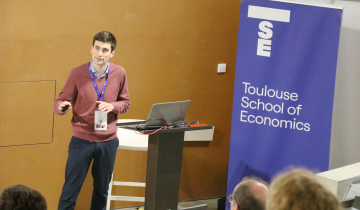Julia HOEFER MARTI will defend her thesis on Thursday, May 16th at 11:30 am, Auditorium 5 & by ZOOM
Title: «Essays on the Economics of Gender and Norms»
Supervisor: Paul SEABRIGHT
To attend the conference, please contact the secretariat Christelle Fotso Tatchum
Memberships are:
- Emmanuelle Auriol : Professor of Economics, TSE, Examinatrice
- Josepa Miquel-Florens :Assistant Professor of Economics, TSE, Examinatrice
- Amma Panin : Assistant Professor of Economics, Université Catholique de Louvain, Rapporteure
- Guido Friebel, Professor of Economics,Goethe University Frankfurt, Rapporteur
Abstract
This thesis contains three essays studying the various ways in which outcomes are shaped by the interaction of economic factors, social norms, and institutional constraints, with a focus on women.
In the first chapter, I study the earnings effects of motherhood, and how they interact with women's sexual orientation. Motherhood carries an earnings penalty for women that is both well known and persistent; however, the share attributable to differences in human capital or productivity has decreased, while the unexplained share has increased over the decades. This has led to a renewed focus on household labor specialization, and the part played by gendered norms in determining it. Lesbian couples are not subject to the same social norms about housework that straight couples are, and indeed, preliminary evidence seemed to suggest that lesbian women see an earnings premium of motherhood.
I investigate empirically, using data from the EU Standards of Living and Income Conditions and US Panel Study of Income Dynamics. I confirm the earnings penalty for straight women but reject a general earnings premium for lesbian mothers; instead, I find suggestive evidence of a motherhood wage premium specifically for lesbian mothers who do not specialize in housework. In contrast, earning more, working more, or doing less housework than their partner are not enough to eliminate the motherhood earnings penalty for straight women, though all reduce it.
The second chapter is co-authored with Paul Seabright; in it, we investigate the idea that social norms against casual sex may inadvertently result in higher rates of sexual assault by incentivizing individuals to consume alcohol as a "disinhibitor" before attempting to find a sexual partner. We construct a decision-theoretic model in which a student may make the decision to consume alcohol as a way of strategically weakening the pressure from social norms against casual sex; the consumption of alcohol then drives incidents of sexual violence.
We take this model to data from the US National Incident-Based Reporting System, using the presence of Planned Parenthood in the university's county as a proxy for the strength of social norms against casual sex. Campuses in counties with no Planned Parenthood present do see higher rates of sexual violence where alcohol is involved. Finally, we examine attitudinal data from the Higher Education Research Institute and find limited evidence that incidents alcohol-fueled sexual violence are related to attitudes against consensual sex.
In the third chapter I study the effects of state intervention in the market for religion. Government support can deliver a dominant market position to a religious denomination, but it may also distort the institutions incentives and reduce its responsiveness to its own adherents. Previous research has attempted to measure the effects of state regulation and/or support of religion only at the population level, and often with only binary measures of state support.
I construct a standardized index of the strength of states' support of religion and study its effects on individuals' external and internal religiosity, and the legitimacy of religious institutions. I find that stronger government support increases external religiosity, but at the cost of decreasing individuals' internal religiosity and trust in religious institutions. These negative effects are felt mostly over the long-term, and are concentrated on members of those religions that receive state support. Women increase their external religiosity less, and the decrease in internal religiosity and trust in religious institutions is more keenly felt. Ultimately, government support has a negative effect on religious affiliation at the population level, but individuals abandon their denomination far more readily than their faith.



